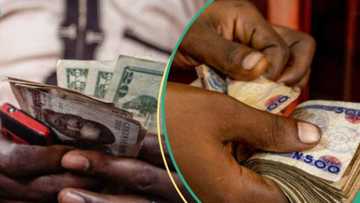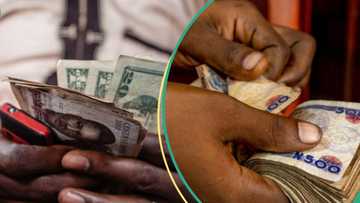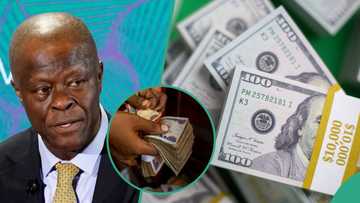Zenith, Access, UBA, Others Increase Loans to Private, Public Sectors to N87trn in One Year
- CBN data has revealed that banks' lending to the economy increased by 42.68% to N87.27 trillion
- According to the data, credit to the government has increased by 55.07% in one year.
- The report also said credit to the private sector reached an all-time high of N54.76 trillion.
PAY ATTENTION: Unlock the best of Legit.ng on Pinterest! Subscribe now and get your daily inspiration!
Legit.ng journalist Zainab Iwayemi has over three years of experience covering the Economy, Technology, and Capital Market.
In August 2023, banks' lending to the economy increased to N87.27 trillion, according to data released by the Central Bank of Nigeria (CBN).
The apex bank said the figure represents a 42.68% Year-on-Year (YoY) increase from N61.17 trillion reported in the same period of 2022.
According to data from the CBN's Money and Credit Statistics, the entire credit in August 2023 comprises N54.76 trillion in private sector borrowing and N32.5 trillion in government borrowing.

Read also
Naira makes remarkable recovery in official, black market after FG’s threat to tax parallel market

Source: UGC
PAY ATTENTION: Donate to Legit Charity on Patreon. Your support matters!
When compared to the N20.97 trillion reported in August 2022, credit to the government has increased by 55.07% YoY, while credit to the private sector climbed by 36.21% YoY from the N54.76 trillion recorded by the apex bank in August 2022.
The reported credit to the private sector of N54.76 trillion is at an all-time high, and this year, more credit is anticipated to be extended to the industry.
Debt continues to rise amid inflation.
Government and private sector debt increase is occurring amid rising inflation and naira depreciation.
Nigeria's inflation rate increased to 25.80% in August 2023 from 20.52% in August 2022.
The value of the naira against the dollar at the Importers & Exporters Foreign Exchange Window (9I & E FX) also fell from N422.38 to N741.768 in August 2022.
Political unrest, currency scarcity, and fuel shortages slowed economic activity in Nigeria's economy in the first quarter of 2023.

Read also
"No More N1,210/$:" Naira hits new low in all markets after FG's promise to crash the dollar
Business conditions in the nation drastically declined in Q1 2023 due to the economy's weak growth.
In March 2023, pricing pressures continued to rise, and borrowing prices rose to a new record high.
In the fourth quarter of 2022, credit growth slowed marginally. In the same quarter, foreign direct investment fell sharply due to a scarcity of US dollars, which forced some businesses to shelve development plans.
The economy recovered from the calm 2023 presidential elections in the second quarter.
Reacting to the increase in credit by banks, Ifeanyi Jeremiah Ubah, Head of Research at Comercio Partners, said that large credit to the economy is good but sometimes increases the inflation rate.
He said:
Individuals, businesses, and government are always seeking for loans from banks. While this facilities their activities, the abundance of it in the economy often further heightens inflation. It is for this reason that the CBN often sees a need to increase the interest rate.

Read also
"It's a promise": Expect stronger naira as FG moves to crash dollar with $10bn inflows in few weeks
Credit to the private sector increased in 2019
According to the report, after the Loan-to-Deposit (LDR) policy was implemented in 2019, credit to the private sector increased by N3.75 trillion, or 16.33 per cent, to finish at N26.69 trillion from N22.95 trillion it opened in 2019.
Credit to the private sector increased 2020 by N3.5 trillion, or 13.12%, to conclude December 2020 at N30.15 trillion, up from N26.65 trillion in January 2020.
However, private sector credit increased by N5.08 trillion (16.57%) in 2021, closing at N35.38 trillion from N30.65 trillion recorded by the CBN in January 2021.
But in 2022, it increased by 18.64% to conclude at N41.74 trillion in December.
Legit. ng had reported that Nigerian banks listed on the Nigerian Exchange significantly increased their lending to customers during the first half of 2023.
Zenith Leads, GTB Follows 10 Banks Deposit Over N150bn in Taxes to Government Account.
Olayemi Cardoso, the new CBN governor, recently declared that he would address the backlog of unpaid foreign exchange commitments at the top bank.
During the senate screening on Tuesday, 26th September 2023, Cardoso pledged to improve corporate governance, increase transparency, and uphold the bank's independence and integrity.
Source: Legit.ng



